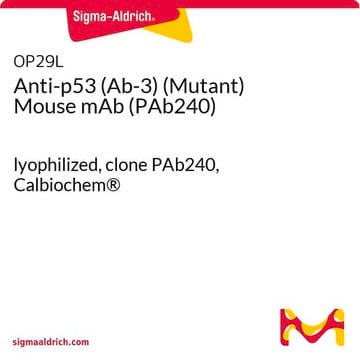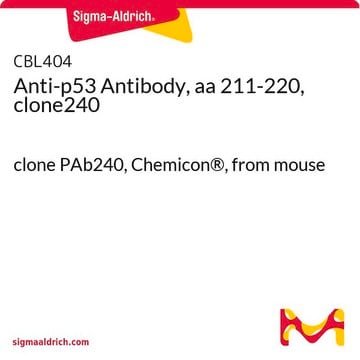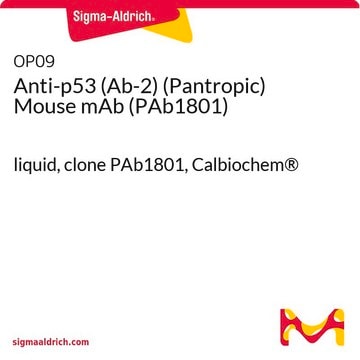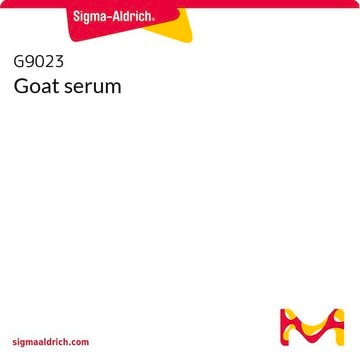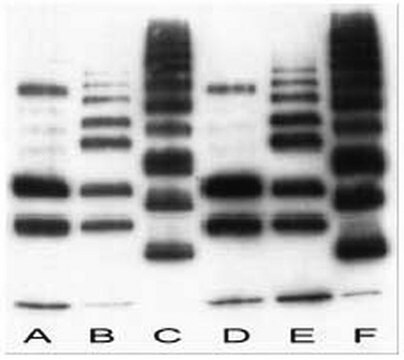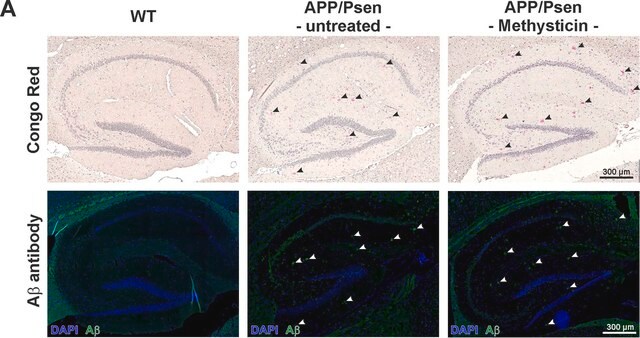おすすめの製品
由来生物
mouse
品質水準
抗体製品の状態
purified antibody
抗体製品タイプ
primary antibodies
クローン
PAb240, monoclonal
フォーム
liquid
含みます
≤0.1% sodium azide as preservative
化学種の反応性
mouse, rat, human, chicken, hamster, bovine
以下との反応禁止
Xenopus
メーカー/製品名
Calbiochem®
保管条件
do not freeze
アイソタイプ
IgG1
輸送温度
wet ice
保管温度
2-8°C
ターゲットの翻訳後修飾
unmodified
遺伝子情報
human ... TP53(7157)
詳細
Purified mouse monoclonal antibody generated by immunizing BALB/c mice with the specified immunogen and fusing splenocytes with SP2 mouse myeloma cells (see application references). Recognizes the ~53 kDa mutant p53 protein under non-denaturing conditions. Recognizes both the mutant and the wild-type p53 protein under denaturing conditions.
Recognizes the ~53 kDa mutant p53 protein under non-denaturing conditions by immunoprecipitation, immunofluorescence, and flow cytometry. Recognizes both mutant and wild-type p53 by immunoblotting and paraffin sections under denaturing conditions.
This Anti-p53 (Ab-3) (Mutant) Mouse mAb (PAb240) is validated for use in FC, Frozen Sections, Gel Shift, Immunoblotting, IF, IP, Paraffin Sections for the detection of p53 (Ab-3) (Mutant).
免疫原
Epitope: within amino acids 213-217
Human
a recombinant protein consisting of amino acids 14-389 of p53 fused to β-galactosidase
アプリケーション
Flow Cytometry (1-20 µg/ml)
Frozen Sections (10 µg/ml)
Gel Shift (see comments)
Immunoblotting (5 µg/ml)
Immunofluorescence (1-20 µg/ml, see application references)
Immunoprecipitation (1 µg per sample)
Paraffin Sections (see application references)
Frozen Sections (10 µg/ml)
Gel Shift (see comments)
Immunoblotting (5 µg/ml)
Immunofluorescence (1-20 µg/ml, see application references)
Immunoprecipitation (1 µg per sample)
Paraffin Sections (see application references)
包装
Please refer to vial label for lot-specific concentration.
警告
Toxicity: Standard Handling (A)
物理的形状
In 50 mM sodium phosphate buffer, 0.2% gelatin, pH 7.5.
アナリシスノート
Negative Control
SK-OV-3 cells
SK-OV-3 cells
Positive Control
A431, Hs27 (wild-type p53), or SK-BR-3 cells or breast carcinoma tissue
A431, Hs27 (wild-type p53), or SK-BR-3 cells or breast carcinoma tissue
その他情報
El-Deiry, W.S., et al. 1994. Cancer Res.54, 1169.
Greenblatt, M.S., et al. 1994. Cancer Res.54, 4855.
Barak, Y., et al. 1993. EMBO J.12, 461.
Kastan, M.B., et al. 1992. Cell71, 587.
Kuerbitz, S.J. 1992. Proc. Natl. Acad. Sci. USA89, 7491.
Lane, D.P. 1992. Nature358, 15.
Kastan, M.B., et al. 1991. Cancer Res.51, 6304.
Greenblatt, M.S., et al. 1994. Cancer Res.54, 4855.
Barak, Y., et al. 1993. EMBO J.12, 461.
Kastan, M.B., et al. 1992. Cell71, 587.
Kuerbitz, S.J. 1992. Proc. Natl. Acad. Sci. USA89, 7491.
Lane, D.P. 1992. Nature358, 15.
Kastan, M.B., et al. 1991. Cancer Res.51, 6304.
Under non-denaturing conditions (immunoprecipitation, immunofluorescence and frozen sections), Anti-p53 (Ab-3) does not recognize normal (wild-type) p53 protein; it recognizes an epitope exposed by activating mutations or denaturation. In denaturing protocols (immunoblotting and paraffin sections), Anti-p53 (Ab-3) will recognize both mutant and wild-type p53. Will not recognize to some p53 molecules with mutations in the RHSVV epitope, but will react to TFIIIA, which has the RHSVV epitope. For gel shift assay, use Cat. No. OP29L and resuspend in 100 µl buffer. Antibody should be titrated for optimal results in individual systems.
法的情報
CALBIOCHEM is a registered trademark of Merck KGaA, Darmstadt, Germany
適切な製品が見つかりませんか。
製品選択ツール.をお試しください
保管分類コード
10 - Combustible liquids
WGK
nwg
引火点(°F)
Not applicable
引火点(℃)
Not applicable
適用法令
試験研究用途を考慮した関連法令を主に挙げております。化学物質以外については、一部の情報のみ提供しています。 製品を安全かつ合法的に使用することは、使用者の義務です。最新情報により修正される場合があります。WEBの反映には時間を要することがあるため、適宜SDSをご参照ください。
Jan Code
OP29-100UG:
OP29-MG:
OP29-20SUG:
OP29-200UG:
OP29-ML:
試験成績書(COA)
製品のロット番号・バッチ番号を入力して、試験成績書(COA) を検索できます。ロット番号・バッチ番号は、製品ラベルに「Lot」または「Batch」に続いて記載されています。
Preethi H Gunaratne et al.
Cancer, 125(14), 2409-2422 (2019-04-24)
Over 96% of high-grade ovarian carcinomas and 50% of all cancers are characterized by alterations in the p53 gene. Therapeutic strategies to restore and/or reactivate the p53 pathway have been challenging. By contrast, p63, which shares many of the downstream
Zih-Yin Lai et al.
International journal of molecular sciences, 22(16) (2021-08-28)
As the most common gene mutation found in cancers, p53 mutations are detected in up to 96% of high-grade serous ovarian carcinoma (HGSOC). Meanwhile, mutant p53 overexpression is known to drive oncogenic phenotypes in cancer patients and to sustain the
Tae Won Kwak et al.
OncoTargets and therapy, 10, 137-144 (2017-01-06)
Epigallocatechin-3-gallate (EGCG) is an antioxidant agent derived from green tea. Because it has chemopreventive and anti-invasive effect against various cancer cells, EGCG can be used to inhibit proliferation and invasion of cholangiocarcinoma (CCA) cells. The anticancer effects of EGCG were
Elisa Borrás et al.
European journal of biochemistry, 270(7), 1493-1501 (2003-03-26)
Several clinical trials have revealed that individuals who were given beta-carotene and vitamin A did not have a reduced risk of cancer compared to those given placebo; rather, vitamin A could actually have caused an adverse effect in the lungs
Adam R Blanden et al.
eLife, 9 (2020-12-03)
Missense mutations in the p53 DNA-binding domain (DBD) contribute to half of new cancer cases annually. Here we present a thermodynamic model that quantifies and links the major pathways by which mutations inactivate p53. We find that DBD possesses two
ライフサイエンス、有機合成、材料科学、クロマトグラフィー、分析など、あらゆる分野の研究に経験のあるメンバーがおります。.
製品に関するお問い合わせはこちら(テクニカルサービス)


